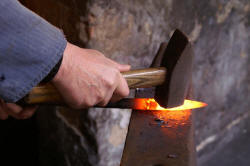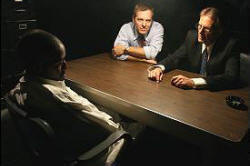Voice: the essentials

 |
What is voice? |
Voice refers to a grammatical construction and, in particular, to the relationship between the doer of an action, the agent and the recipient, the patient. In other words, voice describes the relationship between the verb and what are called its arguments (subject and object).
- John kicked the ball.
- The ball was kicked by John.
Sentence 1 is in the Active voice.
The agent is the subject, John, the verb is kick
+ ed and the patient is the object, the ball.
Sentence 2 is in the Passive
voice.
The agent is still John but he is no longer the subject of the
verb. The verb remains the same but is modified by forming the
tense with the verb be. The patient has been raised to
the subject position but is still the ball.
Here are some more examples:
| Active voice | Passive voice | ||
| 3 | The police arrested her | 7 | She was arrested by the police |
| 4 | They have made the cake | 8 | The cake has been made |
| 5 | People admire him | 9 | He is admired |
| 6 | The dog dropped the bone in the garden | 10 | The bone was dropped in the garden by the dog |
What is the difference in structure between active and passive sentences. Think for a minute and then click here.
Subject (e.g., the dog) + verb (e.g., dropped) + Object (e.g., the bone)
In a passive sentence 10, we have the following order:
Object (the bone) + tense of the
verb to be (was) + past participle (dropped) [+ by
+ Subject (the dog)]
In Sentences 8 and 9, we don't have the last part [in square
brackets]. More about why later.
A simpler and equally correct analysis is that the object of an
active sentence has been promoted to the subject.
 |
Forming the passive in English |
Traditionally, the passive in English is formed like this,
starting with an active sentence. The active sentence for our
example is:
Mary photographed the bird in the garden
These five steps are how we make the active sentence passive:
- Move the object to the front of the sentence (raising it to the
subject position and making it what can now be called the patient)
The bird ... - Insert the appropriate tense of the verb be (in this
case simple past)
The bird was ... - Insert the past participle of the main verb (in this case the
regular form):
The bird was photographed ... - Add, if the meaning requires it, the by-phrase to say
who the original subject of the verb is, now called the agent:
The bird was photographed by Mary ... - Insert any additional information at the end
The bird was photographed by Mary in the garden
(The ordering of the by-phrase and extra information can be reversed so we can have
The bird was photographed in the garden last Tuesday afternoon, in the rain by Mary
or
The bird was photographed in the garden by Mary last Tuesday afternoon in the rain
and so on.)
Complex tense forms with longer subjects and objects conform to the
same rules to convert sentences so we can form the passive from the
active:
The garage on the corner should have been servicing my
and Mary's new Volvo car this week but the owner is off sick
as
My and Mary's new Volvo car should have been being
serviced by the garage on the corner this week but the owner is off sick
 |
Alternative ways to form passives |
In the in-service guide to this area linked in the list of related guides at the end there is much more on this. Briefly, English has two other main ways to form passive sentences:
- With the verb get:
The flowers got battered by the rain
vs.
The flowers were battered by the rain
The sentence with got focuses on the action of the rain (it's called a dynamic passive) but the sentence with were focuses on the state of the flowers after the rain (it's called a stative passive). - With the verbs get and have:
I had my car serviced by the garage on the corner
or
I got my car serviced by the garage on the corner
In both cases, this is called a causative construction and, naturally, there's a guide on the site for more on that linked in the list of related guides at the end.
 |
Other languages |
Languages deal with these things very differently. In some, such as Mandarin, there is arguably no true equivalent. Others, such as Greek, use a special form of the verb and some, such as Spanish, make a construction similar to the way English makes a passive.
Why can't you make a passive of something like The book fell
or John arrived?
Right – the verb must be a transitive one (see
the guide to word class linked in the list of related guides at the end). In other
words, there has to be an object to move to the front
or patient position.
 |
Is there a change in meaning? |
You could argue that
They baked the cake
and
The cake
was baked by them
mean the same thing. In many older
coursebooks (and some not-so-old ones) this is strongly implied by
exercises requiring learners to transform sentences from one voice to
another.
However, the grammar we use to express our thoughts is not randomly
selected. There is a difference between Sentences
3 to 6 and Sentences 7 to 10 above.
In the passive sentence we have chosen to put the most important element
of the sentence at the front (that's why it's called fronting).
We do this for three main reasons:
- Because we are less interested in who did something and more concerned with the receiver of the action. In Sentence 7, we are interested in what happened to her but in Sentence 3, we are concerned with what the police did.
- Because it's obvious what the subject is so unnecessary to state it. Sentence 5 actually sounds odd to many and the idea is better expressed by Sentence 9. It's obvious that people do the admiring.
- Because we don't know what the subject is. So, in
sentences such as
The window has been broken
or
My car has been stolen
we use a passive to avoid a clumsy 'someone has' formulation. In any case, it's the window and the car that concern us, not the vandal or the thief.
There is a fourth use of the passive which, oddly, can be used to
emphasise the Subject. This is usually a spoken form because we
need to stress the subject of the verb when we speak:
The window was broken by her (not me)
or
She was arrested by the police
(not the customs people)
In informal speech, we often use get instead of the verb be. E.g., I don't know how the window got broken.
 |
One last question |
How do we transform this
active sentence into the passive?
The bank lent John the money
Click
here when you have the
answer.
Either:
The money was lent to John (by the bank)
or
John was lent the money (by
the bank)
If you have two objects, you have two possible passive sentences.
Which you choose will depend on what's important.
| Related guides | |
| in-service guide to the passive | this is a more technical guide covering some peculiarities of the passive and learner difficulties with it |
| the essential grammar of the sentence | go here if terms like subject and object are confusing you at all |
| the causative | a guide to a different sort of passive sentence in the in-service section |
| word class | find out here about the different sorts of words and verbs in English |
Click to do a short test on all of this.
